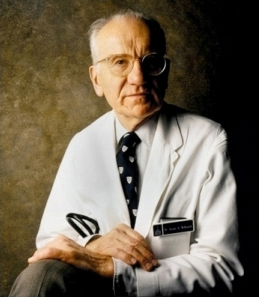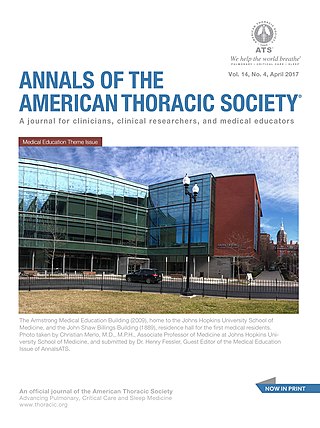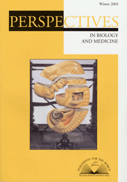BioMed Central (BMC) is a United Kingdom-based, for-profit scientific open access publisher that produces over 250 scientific journals. All its journals are published online only. BioMed Central describes itself as the first and largest open access science publisher. It was founded in 2000 and has been owned by Springer, now Springer Nature, since 2008.
Stanford University School of Medicine is the medical school of Stanford University and is located in Stanford, California. It traces its roots to the Medical Department of the University of the Pacific, founded in San Francisco in 1858. This medical institution, then called Cooper Medical College, was acquired by Stanford in 1908. The medical school moved to the Stanford campus near Palo Alto, California, in 1959.

Victor Almon McKusick was an American internist and medical geneticist, and Professor of Medicine at the Johns Hopkins Hospital, Baltimore. He was a proponent of the mapping of the human genome due to its use for studying congenital diseases. He is well known for his studies of the Amish. He was the original author and, until his death, remained chief editor of Mendelian Inheritance in Man (MIM) and its online counterpart Online Mendelian Inheritance in Man (OMIM). He is widely known as the "father of medical genetics".

The European Molecular Biology Organization (EMBO) is a professional, non-profit organization of more than 1,800 life scientists. Its goal is to promote research in life science and enable international exchange between scientists. It co-funds courses, workshops and conferences, publishes five scientific journals and supports individual scientists. The organization was founded in 1964 and is a founding member of the Initiative for Science in Europe. As of 2022 the Director of EMBO is Fiona Watt, a stem cell researcher, professor at King's College London and a group leader at the European Molecular Biology Laboratory.

Nature Medicine is a monthly peer-reviewed medical journal published by Nature Portfolio covering all aspects of medicine. It was established in 1995. The journal seeks to publish research papers that "demonstrate novel insight into disease processes, with direct evidence of the physiological relevance of the results". As with other Nature journals, there is no external editorial board, with editorial decisions being made by an in-house team, although peer review by external expert referees forms a part of the review process. The editor-in-chief is João Monteiro.
Molecular medicine is a broad field, where physical, chemical, biological, bioinformatics and medical techniques are used to describe molecular structures and mechanisms, identify fundamental molecular and genetic errors of disease, and to develop molecular interventions to correct them. The molecular medicine perspective emphasizes cellular and molecular phenomena and interventions rather than the previous conceptual and observational focus on patients and their organs.

The European Journal of Nuclear Medicine and Molecular Imaging (EJNMMI) is a peer-reviewed medical journal published by Springer. It is the official journal of the European Association of Nuclear Medicine. Since 1976, the EJNMMI has published material related to the field of nuclear medicine, including dosimetry, radiation biology, radiochemistry, radiopharmacology, molecular imaging probes, reporter gene assays, cell trafficking, targeting of endogenous gene expression, and antisense methodologies. As of 2021, the EJNMMI has an impact factor of 10.057.
Biotechnology and Bioengineering is a peer-reviewed scientific journal covering biochemical engineering science that was established in 1959. In 2009, the BioMedical & Life Sciences Division of the Special Libraries Association listed Biotechnology and Bioengineering as one of the 100 most influential journals in biology and medicine of the past century.

Advances in Experimental Medicine and Biology is a peer-reviewed book series. It covers the broad fields of experimental medicine and biology. The series was established in 1967 and is published by Springer Nature. The editors-in-chief are Wim E. Crusio, Haidong Dong, Heinfried H. Radeke, Nima Rezaei, Ortrud Steinlein, and Junjie Xiao.

The Yale Journal of Biology and Medicine is a quarterly peer-reviewed open-access medical journal. It was established in October, 1928 and is the oldest medical student publication still being published. Since 2015, each issue covers a particular topic in biology, medicine, or public health, including experimental and clinical research. The journal's editorial board is composed of Yale University graduate, medical, and professional students. It is published on PubMed Central and is financially supported by the Yale Office of Medical Education.

The Annals of the American Thoracic Society is an official medical journal of the American Thoracic Society (ATS). It publishes original clinical and epidemiological research in the fields of pulmonology, critical care medicine, and sleep medicine. Known colloquially as the "White Journal", the Annals of the American Thoracic Society is one of four journals published by the American Thoracic Society, along with the American Journal of Respiratory and Critical Care Medicine, American Journal of Respiratory Cell and Molecular Biology, and ATS Scholar.
In scientific publishing, the 1969 Ingelfinger rule originally stipulated that The New England Journal of Medicine (NEJM) would not publish findings that had been published elsewhere, in other media or in other journals. The rule was subsequently adopted by several other scientific journals, and has shaped scientific publishing ever since. Historically it has also helped to ensure that the journal's content is fresh and does not duplicate content previously reported elsewhere, and seeks to protect the scientific embargo system.
Nanomedicine: Nanotechnology, Biology and Medicine is a peer-reviewed medical journal published bimonthly by Elsevier. It covers research on nanoscience and nanotechnology applied to the life sciences and medicine. This includes basic, translational, and clinical research. Publishing formats include original articles, communications, reviews, perspectives, notes, and letters to the editor. The Editor in Chief is Professor Tatiana K. Bronich, PhD
Molecular Autism is a peer-reviewed open-access medical journal covering research on the cause, biology, and treatment of autism and related neurodevelopmental disorders.

Lainie Friedman Ross is an American physician and bioethicist who works at the University of Chicago.
The Journal of Trace Elements in Medicine and Biology is a bimonthly peer-reviewed medical journal covering the roles played by trace elements in medical and biological systems. It was established in 1987 as the Journal of Trace Elements and Electrolytes in Health and Disease, obtaining its current title in 1995. It is published by Elsevier on behalf of the Federation of European Societies on Trace Elements and Minerals (FESTEM), of which it is the official journal. The editor-in-chief is Dirk Schaumlöffel. According to the Journal Citation Reports, the journal has a 2017 impact factor of 3.755.








